2016-2017学年人教版初中英语八年级上册Unit1全单元教学案Where did you go on vacation?
人教版八上unit1教案过程与方法
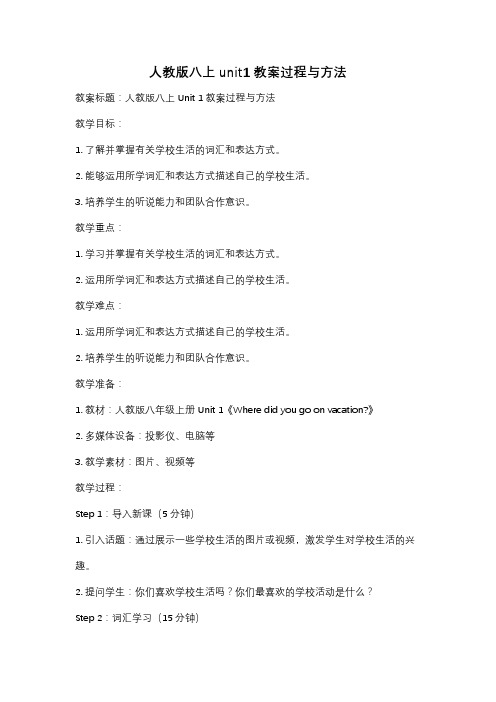
人教版八上unit1教案过程与方法教案标题:人教版八上Unit 1教案过程与方法教学目标:1. 了解并掌握有关学校生活的词汇和表达方式。
2. 能够运用所学词汇和表达方式描述自己的学校生活。
3. 培养学生的听说能力和团队合作意识。
教学重点:1. 学习并掌握有关学校生活的词汇和表达方式。
2. 运用所学词汇和表达方式描述自己的学校生活。
教学难点:1. 运用所学词汇和表达方式描述自己的学校生活。
2. 培养学生的听说能力和团队合作意识。
教学准备:1. 教材:人教版八年级上册Unit 1《Where did you go on vacation?》2. 多媒体设备:投影仪、电脑等3. 教学素材:图片、视频等教学过程:Step 1:导入新课(5分钟)1. 引入话题:通过展示一些学校生活的图片或视频,激发学生对学校生活的兴趣。
2. 提问学生:你们喜欢学校生活吗?你们最喜欢的学校活动是什么?Step 2:词汇学习(15分钟)1. 教师通过多媒体展示学校生活相关的词汇,并帮助学生正确发音和理解词义。
2. 教师与学生一起进行词汇操练,如单词拼写、词义解释等。
Step 3:听说训练(20分钟)1. 教师播放一段关于学校生活的录音,要求学生仔细听,然后回答相关问题。
2. 学生分组进行口语练习,描述自己的学校生活,可以结合所学词汇和表达方式。
Step 4:小组合作活动(15分钟)1. 将学生分成小组,每个小组选择一个学校活动进行介绍。
2. 学生在小组内讨论并准备介绍内容,包括活动的时间、地点、参与人数等。
3. 每个小组派代表进行介绍,其他小组成员可以提问或进行评价。
Step 5:巩固与拓展(10分钟)1. 教师与学生一起进行课堂总结,复习所学内容,并对学生的表现给予肯定和鼓励。
2. 提供一些拓展阅读材料,让学生进一步了解其他学校的生活方式。
Step 6:作业布置(5分钟)1. 布置课后作业:要求学生写一篇短文,介绍自己最喜欢的学校活动,并运用所学词汇和表达方式。
英语 人教版 八年级上册(电子教案)Unit 1
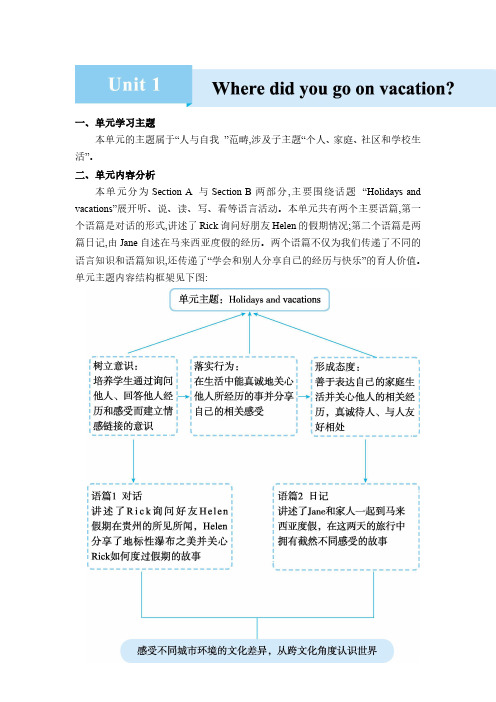
一、单元学习主题
本单元的主题属于“人与自我”范畴,涉及子主题“个人、家庭、社区和学校生活”。
二、单元内容分析
本单元分为Section A与Section B两部分,主要围绕话题“Holidays and vacations”展开听、说、读、写、看等语言活动。
本单元共有两个主要语篇,第一个语篇是对话的形式,讲述了Rick询问好朋友Helen的假期情况;第二个语篇是两篇日记,由Jane自述在马来西亚度假的经历。
两个语篇不仅为我们传递了不同的语言知识和语篇知识,还传递了“学会和别人分享自己的经历与快乐”的育人价值。
单元主题内容结构框架见下图:。
Unit1教案人教版八年级英语上册
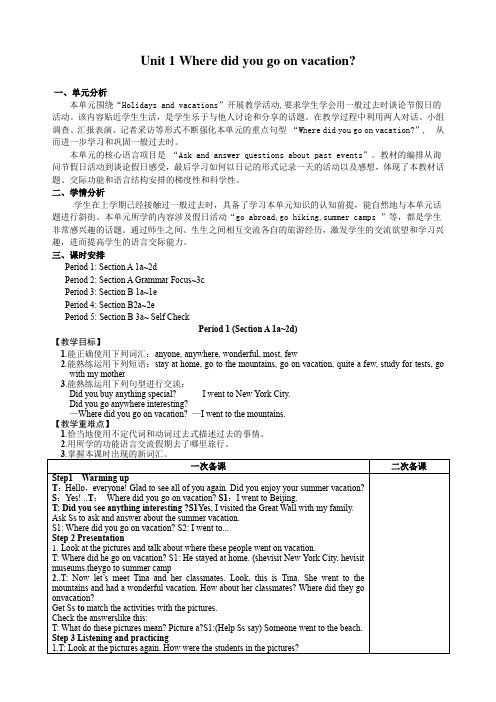
Unit 1 Where did you go on vacation?一、单元分析本单元围绕“Holidays and vacations”开展教学活动,要求学生学会用一般过去时谈论节假日的活动。
该内容贴近学生生活,是学生乐于与他人讨论和分享的话题。
在教学过程中利用两人对话、小组调查、汇报表演、记者采访等形式不断强化本单元的重点句型“Where did you go on vacation?”, 从而进一步学习和巩固一般过去时。
本单元的核心语言项目是“Ask and answer questions about past events”。
教材的编排从询问节假日活动到谈论假日感受,最后学习如何以日记的形式记录一天的活动以及感想,体现了本教材话题、交际功能和语言结构安排的梯度性和科学性。
二、学情分析学生在上学期已经接触过一般过去时,具备了学习本单元知识的认知前提,能自然地与本单元话题进行斜街。
本单元所学的内容涉及假日活动“go abroad,go hiking,summer camps ”等,都是学生非常感兴趣的话题。
通过师生之间、生生之间相互交流各自的旅游经历,激发学生的交流欲望和学习兴趣,进而提高学生的语言交际能力。
三、课时安排Period 1: Section A 1a~2dPeriod 2: Section A Grammar Focus~3cPeriod 3: Section B 1a~1ePeriod 4: Section B2a~2ePeriod 5: Section B 3a~ Self CheckPeriod 1 (Section A 1a~2d)【教学目标】1.能正确使用下列词汇:anyone, anywhere, wonderful, most, few2.能熟练运用下列短语:stay at home, go to the mountains, go on vacation, quite a few, study for tests, gowith my mother3.能熟练运用下列句型进行交流:Did you buy anything special? I went to New York City.Did you go anywhere interesting?—Where did you go on vacation? —I went to the mountains.【教学重难点】1.恰当地使用不定代词和动词过去式描述过去的事情。
人教版八年级英语上册Unit1大单元优秀教学案例
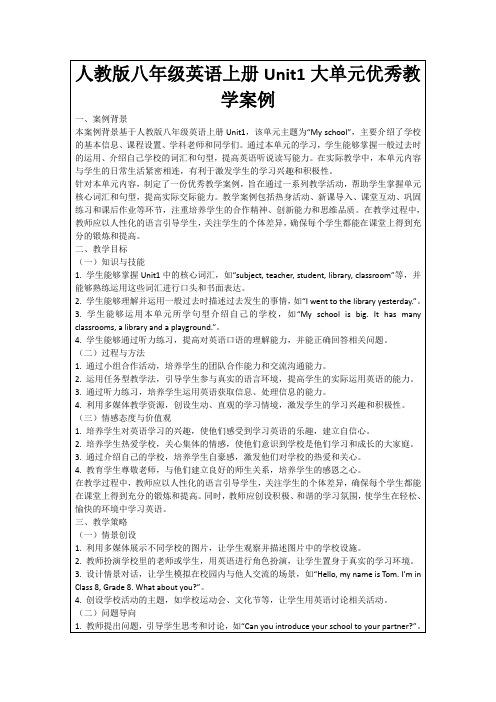
3.小组合作的互动性:本案例中,教师组织学生进行小组合作,共同完成任务。在小组合作过程中,学生相互交流、讨论,共同解决问题。这种方式不仅培养了学生的团队合作能力和交流沟通能力,还促进了学生的自主学习和合作学习。
3.教师对学生的学习成果进行评价,关注学生的个体差异,给予鼓励和指导。
4.设计课后作业,让学生巩固所学知识,提高英语实际运用能力。
在教学过程中,教师应以人性化的语言引导学生,关注学生的个体差异,确保每个学生都能在课堂上得到充分的锻炼和提高。同时,教师应创设积极、和谐的学习氛围,使学生在轻松、愉快的环境中学习英语。
3.鼓励小组成员相互交流、讨论,共同解决问题,如在介绍学校时遇到不会表达的词汇。
4.小组成员互评,教师进行点评,给予肯定和建议,提高学生的合作能力和团队精神。
(四)反思与评价
1.教师引导学生对自己的学习过程进行反思,如在课堂上积极参与程度、小组合作表现等。
2.学生相互评价,发现他人的优点和不足,学会欣赏和尊重他人。
人教版八年级英语上册Unit1大单元优秀教学案例
一、案例背景
本案例背景基于人教版八年级英语上册Unit1,该单元主题为“My school”,主要介绍了学校的基本信息、课程设置、学科老师和同学们。通过本单元的学习,学生能够掌握一般过去时的运用、介绍自己学校的词汇和句型,提高英语听说读写能力。在实际教学中,本单元内容与学生的日常生活紧密相连,有利于激发学生的学习兴趣和积极性。
2016年人教版新目标英语八年级上全册教案

2016年人教版新目标英语八年级上全册教案Unit 1 Where did you go on vacation?Period 1Section A (1a-2d)一、教学目标:1. 语言知识和能力目标:1) 能掌握以下单词:anyone, anywhere, wonderful, quite a few, etc能掌握以下句型:①—Where did you go on vacation? —I went to the mountains.②—Did you go with anyone? —Yes, I did./No, I didn’t.2) 能了解以下语法:—复合不定代词someone, anyone, something, anything等的用法。
—yourself, myself等反身代词的用法。
3)一般过去时态的特殊疑问句,一般疑问句及其肯定、否定回答。
2. 情感态度价值观目标:学会用一般过去时进行信息交流,培养学生的环保意识,热爱大自然。
二、教学重难点1. 教学重点:1) 用所学的功能语言交流假期去了什么旅行。
2) 掌握本课时出现的新词汇。
2. 教学难点:1) 复合不定代词someone, anyone, something, anything等的用法。
2) yourself, myself等反身代词的用法。
三、教学过程Ⅰ. Lead-in1. 看幻灯片来进入本课时的主题,谈论上周末做了些什么事情。
Ⅱ. Presentation1. Show some pictures on the big screen. Let Ss read the expressions.went.2. Let Ss act out the conversations in pairs.3. Some explanations in 2d.Homework:用英语询问你的一位好朋友,她(他)假期去了哪里?看到了什么?并将此对话写在作业上。
人教版初中英语八年级上unit1单元教案

人教版初中英语八年级上unit1单元教案Unit 1 Where did you go on vacation?适用学科英语适用年级初一授课形式一对一课时时长(分钟)120 分钟知识点1. 不定代词(some、any、no、 someone, anyone、 everyone、no one、 something、 anything, everything、nothing 等)2.Simple past tense of regular & irregular verbs.规则&不规则动词的一般过去时学习目标1.Indefinite pronouns 不定代词2.Simple past tense of regular & irregular verbs3.用过去式谈论假期活动1. 不定代词的用法以及哪些是不定代词学习重难点2. 掌握动词过去式的变化规则3. 掌握句型--where did you go on vacation?--I went to the mountains/New York/city/beach/summer camp. --Did you go with anyone?--yes,I did./No,I didn’t4. 掌握如何用过去式谈论假期的活动Unit 1 词汇篇________________________________________________________________ ___________________________________________________________________________________ ___________教学过程一、熟练掌握本单元重点词组句型。
1必背名词:bicycle 自行车;脚踏车 building 建筑物;房子 trader 商人 difference 差别; 单词差异 top 顶部;表面动词:seem 好像;似乎;看来decide 决定;选定wonder 想知道;琢磨 wait 等待;等候代词: anyone 任何人 something 某事;某物 nothing 没有什么;没有一件东西everyone 每人;人人;所有人myself 我自己;我本人yourself 你自己;您自己 someone 某人单词形容词:wonderful 精彩的;绝妙的bored 厌倦的,烦闷的enjoyable 有乐趣的; 令人愉快的 wet 湿的;潮湿的;下雨的 hungry 饥饿的副词: anywhere 在任何地方常用 1. on vacation 在度假短语:3. anything special 任何特别的东西2. stay at home 待在家里 4. study for tests 为测验而学习5. take photos 拍照6. quite a few 相当多;不少7. most of the time 大部分时间8. have a good time 玩得开心9. of course 当然;自然10. keep a diary 记日记重点 1. 谈论过去的经历:(1)---Where did you go on vacation? 句型---went to the mountains.(2) ---Did you see Huangguoshu Waterfall?---Yes, I did.2.谈论及评价食物:---How was the food?----Everything tasted really go!3.谈论旅行的感受: How did you feel about the trip?4.结果状语从句: My legs were so tired that I wanted to stop.二、知识讲解Where did you go on vacation? 你去哪里度假了? Did you go out with anyone? 你和别人一起出去的吗? Did you buy anything special? 你买了什么特别的东西吗?I went to New York City. 我去了纽约市。
八年级上册英语第一单元教案(人教版) (1)
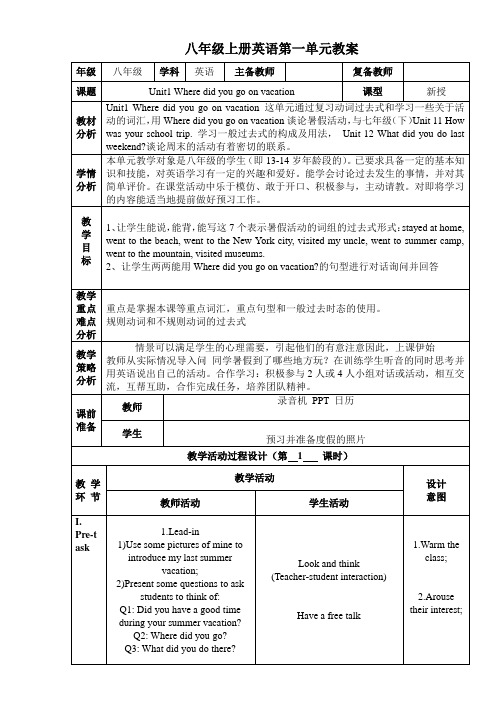
Pre-listening
Listen and write down the letters
Listen and make sentences
Look and talk
(Pair work)
教学
环节
教学活动
设计
意图
教师活动
学生活动
III. Post-task
7.Did you go to summer camp?—No, I didn’
教
学
反
思
英语教学提倡体验、实践、参与、交流与合作的学习方式,要使学生尽可能亲身感受和直接体验语言,本节课结合日常生活中所涉及的语言、词汇等融入一系列小任务中,完成任务型教学活动,让学生达到实际运用所学语言知识进行交流的目的。
课前准备
教师
录音机PPT日历
学生
预习并准备度假的照片
教学活动过程设计(第1课时)
教学
环节
教学活动
设计
意图
教师活动
学生活动
I. Pre-task
1.Lead-in
1)Use some pictures of mine to introduce my last summer vacation;
2)Present some questions to ask students to think of:
T: Each picture shows
something a person did in the past.
Q: Where did they goon vacation?
2)Name each activity and ask students to pay attention to theSimple past tense of regular and irregular verbs;
人教版八年级英语上册精品教案全册完整版(1)

人教版八年级英语上册精品教案全册完整版一、教学内容Unit 1: How often do you exercise?(第一单元:你多久锻炼一次?)Section A: 1a2d(听说练习:谈论日常习惯)Section B: 3a4d(阅读理解:生活方式对健康的影响)Unit 2: What's the matter?(第二单元:你怎么了?)Section A: 1a2d(听说练习:描述身体不适及提出建议)Section B: 3a4d(阅读理解:不同文化下的健康观念)二、教学目标1. 让学生掌握与日常生活、健康习惯相关的词汇和表达方式。
2. 提高学生的听说能力,使他们能够运用所学知识进行情景对话。
3. 培养学生的阅读理解能力,使其能够通过阅读文章获取信息。
三、教学难点与重点1. 教学难点:时态的使用,尤其是一般现在时和一般过去时的区别。
2. 教学重点:词汇和句型的掌握,以及在实际情境中的运用。
四、教具与学具准备1. 教具:多媒体教学设备、黑板、粉笔2. 学具:课本、练习本、词汇卡片五、教学过程1. 导入:通过提问方式引导学生谈论日常锻炼习惯,激发兴趣。
2. 新课展示:a. 教学Unit 1 Section A:1a2d,引导学生学习词汇和句型,并进行角色扮演。
b. 教学Unit 1 Section B:3a4d,讲解阅读文章,指导学生完成练习。
c. 教学Unit 2 Section A:1a2d,学习描述身体不适的词汇和句型,进行角色扮演。
d. 教学Unit 2 Section B:3a4d,分析阅读文章,拓展学生知识面。
3. 随堂练习:针对每个课时,设计相应的练习题,检验学生学习效果。
六、板书设计1. 核心词汇:以表格形式呈现,包括中英文对照、词性、例句。
2. 重点句型:以对话形式展示,突出语法点。
3. 阅读文章框架:以思维导图形式呈现,便于学生理解和记忆。
七、作业设计1. 作业题目:a. 根据所学词汇,编写一段关于自己日常锻炼的对话。
人教版八年级英语上册Unit1Wheredidyougoonvacation单元整体优秀教学案例

人教版八年级英语上册Unit1Wheredidyougoonvacation单元整体优秀教学案例
一、案例背景
本案例背景以人教版八年级英语上册Unit1 "Where did you go on vacation?"为例,本单元主要围绕假期旅行的话题展开,通过学习让学生掌握一般过去时的运用、询问和描述过去发生的事情、以及常用的旅游词汇等。
(五)作业小结
1.作业布置:布置一些与旅游话题相关的作业,如写一篇关于假期的短文、制作一个旅游日志等,让学生在课后巩固所学知识。
2.作业反馈:教师对学生的作业进行及时的反馈和评价,鼓励他们继续努力,提高他们的学习效果。
3.课后反思:鼓励学生对本次课堂学习和作业完成情况进行反思,帮助他们发现自己的优点和不足,提高自我调整和改进的能力。
2.生活情境:结合学生的生活经验,设计一些与旅游相关的情境,让学生在真实生活中运用英语进行交流,提高他们的语言运用能力。
3.角色扮演:让学生分组扮演不同角色,如旅游顾问、游客等,进行角色扮演活动,让学生在模拟情境中运用所学知识,提高他们的口语表达能力。
(二)问题导向
1.启发式提问:通过提出引导性问题,激发学生的思考和探究欲望,引导学生主动参与到学习过程中。
2.层层递进:设计一系列由浅入深的问题,引导学生逐步深入探讨课文内容,帮助他们更好地理解和掌握知识。
3.任务驱动:设计一些具有挑战性的任务,让学生在完成任务的过程中思考和解决问题,提高他们的解决问题的能力。
人教版八年级英语unit1 教学设计

Unit1 What's the matter?SectionB 2a--2e科目:英语设计者:学校:授课班级:学生人数:课题:Unit1 What's the matter?课型:阅读课授课日期:一、课标描述(摘要)及其解读明确自己的学习需要和目标,对英语学习表现出较强的自信心。
能在日常交际情景中听懂对话和小故事。
能就熟悉的生活话题交流信息和简单的意见。
能读懂短片故事。
能写便条和简单的书信。
能尝试使用不同的教育资源,从口头和书面材料中提取信息,扩展知识,解决简单的问题并描述结果。
能在学习中互相帮助,克服困难。
能合理计划和安排学习任务,积极探索适合自己的学习方法。
在学习和日常交际中能注意到中外文化差异。
这就要求八年级学生在阅读课中达到能读懂短片故事,理解文章的主要含义;能通过合作将文章修改为简短的叙述、说明;能尝试使用不同的教育资源,从书面材料中提取信息、扩展知识、解决简单的问题并描述结果。
二、教材分析本单元包括四个板块的内容,(SectionA,Grammar Focus,SectionB,Self Check),这一单元的四个大部分基本上都围绕着“健康问题”“意外事故及处理建议”这些话题展开,语言技能和语言知识都是依据这一中心话题而设计的。
本单元主要学习谈论健康状况和意外事故的处理建议。
学习询问人们的健康状况以及针对不同健康问题提出意见和建议,并鼓励对病人及时出手相助,同时了解常见的意外事故的处理办法,遇到意外事故时要及时作出正确的决定。
教育学生注意饮食健康,关心他人,学会处理意外事故。
包括人体部位名称,各种疾病表示法以及怎样给别人提出建议和意见。
语法学习情态动词should、shouldn’t的使用和询问、描述健康状况以及回答的句子。
这些话题非常贴近学生生活实际,学生会非常感兴趣,因此,在教学过程中,应充分调动学生的积极性,鼓励学生大胆练习,运用英语表达与此话题有关的内容,以此来对学生进行情感态度的培养,让学生学会关爱自己,照顾他人,并正确应对意外事故。
人教版英语八年级上册Unit1单元教学设计
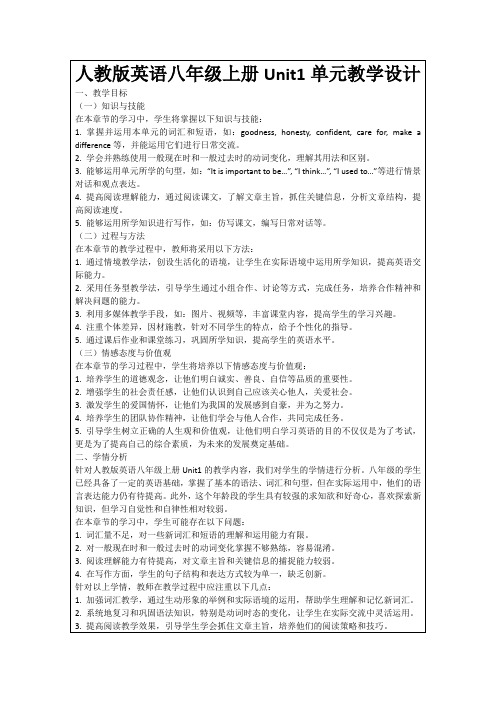
一、教学目标
(一)知识与技能
在本章节的学习中,学生将掌握以下知识与技能:
1.掌握并运用本单元的词汇和短语,如:goodness, honesty, confident, care for, make a difference等,并能运用它们进行日常交流。
2.学会并熟练使用一般现在时和一般过去时的动词变化,理解其用法和区别。
3.激发学生的爱国情怀,让他们为我国的发展感到自豪,并为之努力。
4.培养学生的团队协作精神,让他们学会与他人合作,共同完成任务。
5.引导学生树立正确的人生观和价值观,让他们明白学习英语的目的不仅仅是为了考试,更是为了提高自己的综合素质,为未来的发展奠定基础。
二、学情分析
针对人教版英语八年级上册Unit1的教学内容,我们对学生的学情进行分析。八年级的学生已经具备了一定的英语基础,掌握了基本的语法、词汇和句型,但在实际运用中,他们的语言表达能力仍有待提高。此外,这个年龄段的学生具有较强的求知欲和好奇心,喜欢探索新知识,但学习自觉性和自律性相对较弱。
-引导学生反思本节课的学习过程,培养他们的自主学习能力。
2.教学实施
-教师带领学生回顾本节课所学的新词汇、短语、句型和语法知识,并进行口头练习。
-让学生分享自己在课堂上的收获和感受,鼓励他们提出问题,激发进一步学习的兴趣。
五、作业布置
为了巩固本章节的学习内容,提高学生的英语能力,特布置以下作业:
1.词汇和短语练习:请学生完成课后练习中的词汇填空、短语搭配等题目,以加深对新词汇和短语的理解和记忆。
3.阅读理解能力的提升:培养学生抓住文章主旨,分析文章结构,理解作者观点的能力,是提高英语素养的关键,也是本章节的教学难点。
(完整版)人教版八年级英语上册-Unit1-教案

(完整版)人教版八年级英语上册-U n i t1-教案-CAL-FENGHAI.-(YICAI)-Company One1Unit 1 Where did you go on vacation教材解读本单元的核心话题是用一般过去时谈论度假等发生在过去的事情。
因此“Where did you go on vacation?”“Did you go to the beachYes,I did / No,I didn’t.”等是教学的重点。
通过对本单元的学习,学生能掌握本单元出现的地点名词,用于询问和回答过去发生的事情的短语和句型。
单元目标一、知识与技能1. 词汇:New York City, Central Park, exam, were, rainy, delicious,expensive, inexpensive, crowded, flew, kite, later, felt, little, corner, discuss, etc.2. 句型: Where did you go on vacation I went to summer camp.Did she go to Central ParkYes, she did.No, she didn’t.3. 语法:一般过去时的特殊疑问句、一般疑问句及肯、否定回答。
4. 能力目标:能用一般过去时熟练谈论假期发生的事。
二、过程与方法灵活运用教材,从所教学生的实际水平和语言能力出发,调整和取舍教学内容,合理安排本单元的课时数,设计好每课时的教学内容。
三、情感、态度与价值观1.通过描述假期发生的事,增进同学间的了解,增进感情。
2.通过图片和视频欣赏优美的风景,培养热爱祖国大好河山的思想感情,提高学生的环保意识。
3.了解自己的能力,培养情操4.培养学生们对英语的兴趣。
教法导航1. 以任务型教学作为课堂教学理念、利用整体语言教学法、情景教学法、交际教学法等。
【人教版】八年级英语上册 Unit 1 全单元英文教案
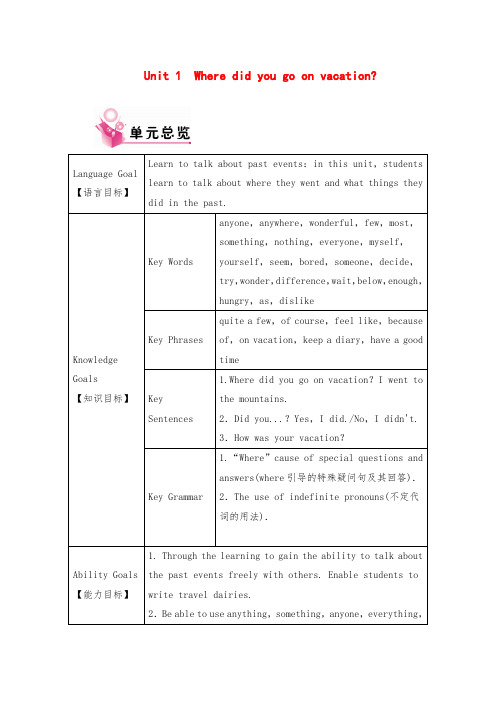
Unit 1Where did you go on vacation?本单元教材以Where did you go on vacation ?为中心话题,围绕着描述“过去发生的事情”展开,学习和运用一般过去时态的一般疑问句Did yougo/see/buy...?和特殊疑问句Where/What/How...?询问过去的事件,让学生学会谈论和分享过去发生的事件。
本课教学内容与学生的实际生活密切相关,易于引发学生运用简单的英语进行交流。
在学习活动中,学生通过交换对过去发生的事情的描述及看法,促进学生之间和师生之间的情感交流,增进情谊。
Section A 的主要学习内容是:复习一般过去时态和动词的规则与不规则变化,学习一般过去时态的一般疑问句:Did you...?及不定代词的用法。
Section B 安排了许多听、说、读、写的任务活动,教师在教学中可以灵活运用这些活动,将其中的一些活动进行变化或整合,充分调动学生参与的积极性,提高学生的听说读写能力。
第一课时 Section A(1a -2d)Teaching Goals 【教学目标】Key words & phrases :anyone ,anywhere ,wond erful ,few ,most ,quite a few ,go on vacation Key sentences :1.Where did you go on vacat ion ?I went to the mountains/New YorkCity/summer camp/the beach.2.Did you...?Yes,I did./No,I didn't.T eaching Key Points 【教学重点】The vocabulary:New York City,Central Park,few,most,quite a few,on vacation Target language:Where did you/they/he/she go on vacation?I/They/He/She went to the mountains/New York City/summer camp/the beach. Did you...?Yes,I did./No,I didn't.Teaching Difficult Points 【教学难点】Use the target language above to talk about past events.Teaching Aids 【教学工具】An English textbook,a tape recorder,CAI or courseware.Teaching Steps 【教学过程】★Step 1 Leading inGreet the class and introduce what to learn in this period.Teacher:Welcome back to school!Did everyone have a good time during the summer vacation?Today we'll begin to learn the topic where you went on vacation.Teacher:Where did you go on vacation?Students:______.①I went to the mountains.②I visited museums.…★Step 2 Pre-taskPage 1,1a & 1b.1.Look at the picture.2.Match each activity.3.Check the answers in 1b.4.Practice reading.Page 1,1c.1.Focus on the conversation in the box.2.Practice reading.3.Pairwork:Where did you go on vacation?I...4.Groupwork:Divide the class into groups of four or five. Make conversations.First S1 to S2:S1:Where did you go on vacation?S2:I...S1:Where did she/he go on vacation?S2:She/He...★Step 3 While-taskPage 2,2a & 2b.1.Play the recording for the first time. Students complete the chart in 2a.2.Check the answers.(Point to one student who raises his or her hand.) 3.Play the recording a second time and say:There are three conversations. The people talk about where they went on vacation. Listen to the recording and check(√)Yes,I did or No,I didn't for each question.4.Correct the answers.★Step 4 Post-taskPage 2,2c & 2d.1.Focus on the conversation in 2c & 2d.2.Practice reading. Make students scan the conversations first.3.Teach and then make students role-play the conversation in pairs.4.Have a group of students present their conversation to the class.★Step 5 Homework1.Practice the conversation on Page 2,2d.2.Do the exercises on Page 1 in students' book.Board Design 板书设计Unit 1 Where did you go on vacation?The first period Section A(1a-2d)1.Key vocabulary:anyone,anywhere,wonderful,quite a few,go on vacation2.Target language:A:Where did Tina go on vacation?B:She went to the mountains.第二课时Section A(GF-3c)Teaching Goals 【教学目标】Key words:something,nothing,everyone,myself,yourself,someone,seem,bored,diaryKey phrases:go out,have a good time,of course,keep a diaryKey sentences:1.Where did you go on vacation?I went to New York City.2.Did you go out with anyone?Did you buy anything special?3.How was the food?How was your vacation?Teaching Key Points 【教学重点】The vocabulary:something,nothing,everyone,myself,yourself,someone,seem,bored,diary,go out,have a good time,of course,keep a diary,on vacation Target language:How was the food?Everything tasted really good!Did you go shopping?Of course!Did everyone have a good time?Oh,yes. Everything was excellent.Teaching Difficult Points 【教学难点】e the target language above to talk about past events.2.The usage of someone,anyone,everyone,no one,something,anything,everything,nothing.Teaching Aids 【教学工具】An English textbook,CAI or courseware.Teaching Steps 【教学过程】★Step 1 Leading in(T—teacher S—student)T:Where did you go last weekend?S:I went to the beach.T:Did you go there with anyone?S:Yes. I went to the beach with my brother.T:Did you have a good time there?S:...★Step 2 Pre-taskPage 3,Grammar Focus.1.Review the grammar box. Work in pairs. One asks and the other answers.2.Practice reading the sentences in the chart.★Step 3 While-taskPage 3,3a & 3b.1.Teach these new words:anyone,something,anything,everything,nothing,everyone,no one.2.Call students' attention to the conversation in 3a. Make students complete it individually.3.Choose a student to give his or her answers. Write the answers on the board.4.Correct the answers.5.Lead students to read this conversation.6.Have students work in pairs and role-play the conversation. As they talk,move around the classroom monitoring their work. Offer language or pronunciation support as needed.7.Make students complete the blanks in the e-mail message in 3b with the words in the box.8.Check the answers and then make students practice reading it.★Step 4 Post-taskPage 3,3c.Complete the task in 3c.Ask your group questions about their last vacation. Then tell the class your results.★Step 5 Homework1.Review the indefinite pronouns learned in this period.2.Do the exercises on Page 2 in students' book.Board Design 板书设计Unit 1 Where did you go on vacation?The second period Section A(GF-3c)1.The vocabulary:something,nothing,everyone,someone,myself,yourself,go out,of course2.Target language:①A:Where did you go on vacation?B:I went to New York City.②A:Did you buy anything spec ial?B:Yes,I bought something for my father.3.Structure:something special4.Answers to 3a and 3b.第三课时Section B(1a-1e)Teaching Goals 【教学目标】Key words:delicious,exciting,terrible,expensive,cheap,boringKey sentences:1.Where did Lisa go on vacation?2.Did she do anything special there?Did she buy anything for her best friend?Did Lisa like her vacation?3.How was/were...?Teaching Key Points 【教学重点】The vocabulary:delicious,exciting,terrible,expensive,cheap,boringTarget language:Where did Lisa go on vacation?Did she do anything special there?Did she buy anything for her best friend?How was/were...?Teaching Difficult Points 【教学难点】1.询问去过何地以及感受(评价)Where did you go?I went to the beaches. How was it?It was exciting.2.Use the target language to talk about your past events.Teaching Aids 【教学工具】An English textbook,a tape recorder,CAI or courseware.Teaching Steps 【教学过程】★Step 1 Leading in1.Greetings.2.T:Where did you go on vacation?S:I went to summer camp.T:Did you do anything special there?S:Yes,I...T:Did you buy anything for your parents or friends?S:Yes,I bought...for.../No,I bought nothing.T:How was/were...?S:It was/They were...★Step 2 Pre-taskPage 4,1a & 1b.1.Look at the six pictures.2.Match the words with the pictures.3.Students complete the task in 1b individually.4.Check the answers.★Step 3 While-taskPage 4,1c & 1d.1.Make students scan the questions in 1c.2.Play the recording for the first time. And say:Listen to the tape. Lisa is talking about her vacation. Complete the four questions.3.Play the recording a second time. Students complete the task in 1d.4.Correct the answers.★Step 4 Post-taskPage 4,1e.Ask 3 or 4 students to answer questions about Lisa's vacation. You can begin your questions with:Where did...?What did...?Did she...?How was...?How were...?★Step 5 Homework1.Review these sentences:Where did...?Did...?How was/were...?2.Do the exercises on Page 3 in students' book.Board Design 板书设计Unit 1 Where did you go on vacation?The third period Section B(1a-1e)1.Words:delicious,exciting,terrible,expensive,cheap,boring 2.Sentences:①Where did Lisa go on vacation?②Did she buy anything special?③Did she buy anything for her best friend?④Did Lisa like her vacation?3.Answers to Activity 1a:1—5 f a c e b dAnswers to Activity 1b:wordsdeliciousexcitingcheapwordsterribleexpensiveboring第四课时Section B(2a-2e)Teaching Goals 【教学目标】Key words:activity,decide,try,bird,bicycle,building,trader,wonder,difference,top,wait,umbrella,wet,below,enough,hungry,as Key phrases:feel like,because of,go to the beach,a lot of,a little,take the train,too many,what aboutKey sentences:1.I wonder what life was like here in the past.2.What a difference a day makes!3.We waited over an hour for the train because there were too many people.Teaching Key Points 【教学重点】Learn Jane's diary entries about her vacation.1.The vocabulary:activity,decide,try,wonder,difference,wait,below,enough,hungry,as,feel like,because of2.Target language:I wonder what life was like here in the past. We waited over an hour for the train because there were too ma ny people.Teaching Difficult Points 【教学难点】1.because and because of2.What a difference a day makes!3.Learn to write a diary.Teaching Aids 【教学工具】An English textbook,CAI or courseware.Teaching Steps 【教学过程】★Step 1 Leading in1.Greetings.2.Introduce what to learn in this perio d,especially the articles in 2b,Jane's diary entries. Teacher begins like this:Today we'll focus on two diary entries about Jane's vacation. Through the learning you'll know how to write a diary. Let's begin now.★Step 2 Pre-taskPage 5,2a & 2b.1.Review and discuss the questions in 2a box with your partner.2.Project these new words on the screen or write them on the board and teach the new words. Ask students to repeat them. And make sure everyone knows the meanings.activity n.活动;decide v.决定;try v. & n.尝试,设法;wonder v.想知道;difference n.差异;top n.顶部;wait v. & n.等待;umbrella n.伞;below prep. & adv.在……下面;enough adj.充足的;hungry adj.饥饿的3.Make students scan the articles first. Ask students to put a mark in contents that are unfamiliar to them. Then the teacher lead students to learn these two articles sentence by sentence. Pay attention to these points:(1)decide v.决定;decide to do sth.决定做某事;(2)try v.尝试;try doing sth.尝试做某事;try to do sth.尽力做某事;(3)below prep. & adv.在……下面;(4)feel like 给……的感觉;(5)because and because of;(6)wonder v.想知道4.Practice reading.★Step 3 While-taskPage 6,2c & 2d.1.Make students read Jane's diary entries again. Fill in the chart in 2c.2.Students complete the conversation in 2d using the information in Jane's dairy entries.3.Choose 3 or 4 students to give their answers.4.Correct the answers.5.Have students work in pairs. Student A will be Anna and student B will be Jane. Act the conversation out.★Step 4 Post-taskPage 6,2e.1.Make students complete the blanks in 2e.2.Ask one student to write his or her answers on the board.3.Check the answers together with the class.4.Practice reading.★Step 5 Homework1.Write a diary.2.Do the exercises on Page 4 in students' book.Board Design 板书设计Unit 1 Where did you go on vacation?The fourth period Section B(2a—2e)1.Key vocabulary:decide,try,wonder,difference,top,wait,below,enough,hungry,as,feel like,because of,too many2.Sentences:①I wonder what life was like here i n the past.②And because of the bad weather,we couldn't see anything below.第五课时Section B(3a-Self Check)Teaching Goals 【教学目标】Key words & phrases:duck,dislike,take photos,Tian'anmen Square,the Palace Museum,bring back,shopping center,have a fun time,school trip,come up Key sentences:1.How did you feel about the trip?2.It was so beautiful tha t we forgot about the last five hours!Teaching Key Points 【教学重点】The vocabulary:dislike,take photos,Tian'anmen Square,the Palace Museum Target language:What did you like best?Did you dislike anything?How did you feel about the trip?Teaching Difficult Points 【教学难点】Write a travel diary.Teaching Aids 【教学工具】An English textbook,CAI or courseware.Teaching Steps 【教学过程】★Step 1 Leading in1.Greetings.2.T:Beijing is the capital of our country. It's famous for its long history and places of interest,such as Tian'anmen Square,the Palace Museum,the Summer Palace and so on. And Beijing duck is very delicious. Have you ever been to Beijing?Tell your travel to us.★Step 2 Pre-taskPage 7,3a.1.Look at the three pictures.2.Use the words and phrases in the box to complete the blanks in thearticle.3.Check the answers.★Step 3 While-taskPage 8,Self Check.Complete the tasks in Self Check.1.Have students complete the task of Part 1.Then Choose 2 or 3 students to give their answers. Check the answers.2.Induct students to complete the passage of Part 2.Check the answers.3.Practice reading.★Step 4 Post-taskPage 7,3b & 3c.1.Make students answer the questions in 3b and take notes.2.Teach students how to write a travel diary.3.Students write a travel diary like Jane's on Page 5 using the notes in 3b.4.Choose 2 or 3 students' diaries. Make students read them out. Point out the weakness and induct the students to correct their diaries.★Step 5 Homework1.Write a travel diary.2.Do the exercises on Page 5 in students' book.Board Design 板书设计Unit 1 Where did you go on vacation?The fifth period Section B(3a-Self Check)1.Key vocabulary:dislike,Tian'anmen Square,the Palace Museum,have a fun time,come up2.Sentences:①Did you dislike anything?②How did you feel about the trip?③My legs were so tired that I wanted to stop.。
人教版英语八年级上册 Unit 1 全单元教案

人教版英语八年级上册 Unit 1 全单元教案XXX aims:1.To learn and use the compound indefinite pronouns someone。
anyone。
something。
anything。
and the reflexive pronouns yourself。
myself correctly.2.XXX.3.To use the nal language to XXX.Key points:1.The use of XXX.2.XXX XXX.3.The use of XXX.Difficult points:1.The correct XXX.2.XXX XXX.Language points:anyone。
anywhere。
wonderful。
quite a few。
most。
something。
nothing。
everyone。
of course。
myself。
yourself Ability:1.XXX.2.XXX.Teaching re:Step 1: Lead-inAsk students to share their summer XXX.Step 2: XXX1.Display pictures on the board and have students read the ns.2.Introduce XXX。
anyone。
something。
XXX examples of how they are used in XXX.3.Teach the XXX examples and allow students to practice.4.Introduce XXX examples of how they are used in XXX.Step 3: PracticeXXX.2.Provide XXX.Step 4: nXXX spot。
人教版八年级英语上册Unit1课优秀教学案例
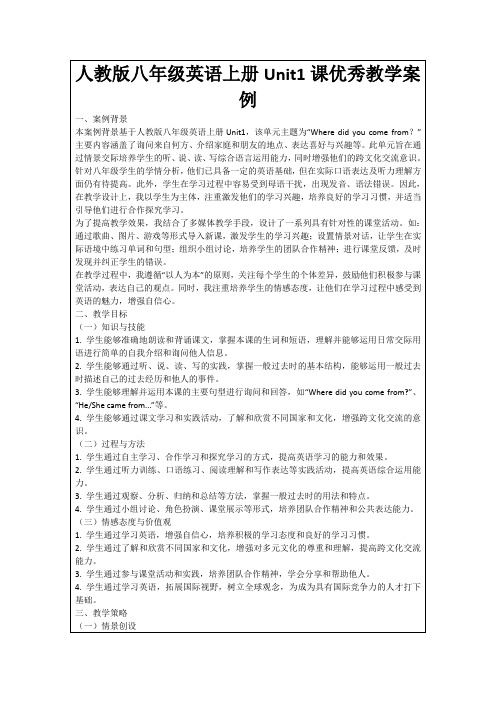
1.学生通过学习英语,增强自信心,培养积极的学习态度和良好的学习习惯。
2.学生通过了解和欣赏不同国家和文化,增强对多元文化的尊重和理解,提高跨文化交流能力。
3.学生通过参与课堂活动和实践,培养团队合作精神,学会分享和帮助他人。
4.学生通过学习英语,拓展国际视野,树立全球观念,为成为具有国际竞争力的人才打下基础。
(五)作业小结
在课堂的最后,我布置了一道作业,要求学生运用所学知识,写一篇关于自己和家人、朋友的介绍文章。这道作业旨在让学生巩固所学知识,提高他们的写作能力。在作业布置过程中,我强调了对作业质量的要求,并鼓励学生认真完成,以提高他们的学习效果。
五、案例亮点
1.情景创设丰富多样:本案例中,教师利用多媒体手段如图片、歌曲、视频等,为学生创造了生动、真实的学习情境,使学生在实际语境中进行听力理解和口语练习。这种情景创设的方式不仅激发了学生的学习兴趣,还提高了他们的综合语言运用能力。
(二)过程与方法
1.学生通过自主学习、合作学习和探究学习的方式,提高英语学习的能力和效果。
2.学生通过听力训练、口语练习、阅读理解和写作表达等实践活动,提高英语综合运用能力。
3.学生通过观察、分析、归纳和总结等方法,掌握一般过去时的用法和特点。
4.学生通过小组讨论、角色扮演、课堂展示等形式,培养团队合作精神和公共表达能力。
人教版八年级英语上册Unit1课优秀教学案例
一、案例背景
本案例背景基于人教版八年级英语上册Unit1,该单元主题为“Where did you come from?”主要内容涵盖了询问来自何方、介绍家庭和朋友的地点、表达喜好与兴趣等。此单元旨在通过情景交际培养学生的听、说、读、写综合语言运用能力,同时增强他们的跨文化交流意识。
人教版八年级上册英语第一单元教案

人教版八年级上册英语第一单元教案一、教学目标。
1. 语言知识目标。
学生能够正确拼写、认读和运用本单元的重点单词,如:anyone, anywhere, wonderful, few, most等。
掌握重点短语,如:go on vacation, stay at home, go to the mountains 等。
学生能够理解并运用一般过去时描述过去的经历,包括肯定句、否定句、一般疑问句及其回答。
2. 语言技能目标。
听:能听懂有关度假经历的简单对话和短文。
说:能够运用所学单词和句型,用一般过去时流利地描述自己或他人的度假经历。
读:能读懂关于旅游经历的文章,理解文章大意并获取关键信息。
写:能够根据提示,用一般过去时写出自己的一次旅行经历。
3. 情感态度目标。
通过分享旅行经历,激发学生对旅游和探索世界的兴趣。
培养学生积极参与课堂活动,与同学合作交流的意识。
二、教学重难点。
1. 教学重点。
一般过去时的用法,尤其是动词的过去式变化规则。
本单元重点单词和短语的记忆与运用。
2. 教学难点。
一般过去时中不规则动词的过去式的记忆和正确使用。
如何引导学生在口语和写作中准确、生动地描述旅行经历。
三、教学方法。
1. 情景教学法。
通过创设旅行相关的情景,让学生在真实的语境中学习和运用英语。
2. 任务驱动法。
布置各种任务,如小组讨论、角色扮演、写作任务等,让学生在完成任务的过程中提高语言综合运用能力。
3. 交际教学法。
鼓励学生之间进行英语交流,分享旅行经历,提高口语表达能力。
四、教学过程。
1. 导入(5分钟)通过展示一些著名旅游景点的图片,如长城、埃菲尔铁塔、金字塔等,引起学生的兴趣,然后提问学生:“Have you ever been to these places? Where did you go on vacation last year?”引导学生用简单的英语回答。
播放一段关于旅游的短视频,视频中包含人们在不同地方游玩的场景,看完视频后,再次提问学生关于旅游的话题,如:“What can you see in the video? Where do you want to go most?”2. 知识讲解(15分钟)单词学习。
人教版-英语-八上-1单元 教学设计)
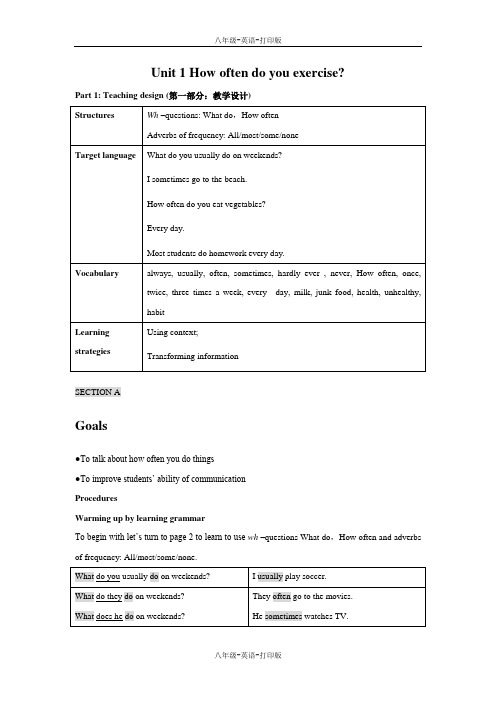
Unit 1 How often do you exercise?Part 1: Teaching design (第一部分:教学设计)SECTION AGoals●To talk about how often you do things●To improve students’ ability of communicationProceduresWarming up by learning grammarTo begin with let’s turn to page 2 to learn to use wh–questions What do,How often and adverbs of frequency: All/most/some/none.How often do you shop? I shop once a month.How often does Cheng watch TV? He watches TV twice a week.Warming up by discussingGood morning! From now on you are in the eighth grade. Congratulations to you and I wish you a great success in your studies! I’ll be your new English teacher this term. I hope we’ll get along very well.Today we shall take up the first unit in this new term: Unit1How often do you exercise? Please open your books at page 1. Look at the picture and answer my question.T:What’s this? Wang Wei, can you name it?Wang Wei: Yes. It’s a calendar.T:Very good. Look, this is the weekend. Saturday and Sunday arethe weekends. What do you do on weekends? Now to learn moreabout the things you do, please find out more with your partners about the activities.For example:Writing letters playing tennis going shopping playing computer games Models:A: What do you do on weekends?B: I often play football.B: What do you do on weekends?A: I sometimes go shopping.1a. Making a listOpen your book at page 1. Let’s look at 1a. Each t hought bubble showssomething a person does on weekends. Now please look at the picture carefully and describe it. Name each activity:T: Good. Please look at the picture again and list all the activities. If you finish it first, write the answer on the board.Now let’s check the answers on the blackboard together.Keys: 1. go skateboarding 2. watching TV 3. reading 4. exercising 5. shopping1b Listening and writingLook at the pictures again and tell what the person does on weekends.Good. Next, please listen to the conversation. The people are talking about what they do on weekends. First listen to the tape carefully and find how often they do on weekends.Next listen again and write the letter of one activity after the word in the list. For example, on the recording someone says, “I always go shopping.” Shopping is letter a in the picture in activity 1a.So you put an a after the word always in this list.Then listen to the tape the third time and check the answers.Finally you are to read the tapescript, underlining all the expressions and circle all the Wh –questions.Answers: always: a usually: c often: e sometimes: d hardly ever: d never: a1c Doing pairworkAfter talking about the picture, we get to understand the activities. Now in pairsask your partner about the people in the picture.What do they do on weekends?or2a Listening and numberingNow let’s go to page 2. Listen to the tape and number the activities you hear.This is an interview about what a boy named Cheng usually does. Listen to therecording and number the activities in the order they talk about them in theinterview. The first thing they talk about is watching TV, so you put a number infront of watching TV. You must pay more attention to the activities.Now you read the list.Listen to the tape the first time. You only listen.Listen to the tape a second time. This time you should write a number in front of each activity. Let’ check the answers.Keys:Finally let’s read t he tapescript, underlining all the expressions and circle all the Wh–questions. 2b Listening and matchingListen again and match each activity with how often Cheng does that activity.While listening, pay attention to the heading How often? in the chart.2c Doing pairworkHow often do you do the activities? Look at the chart.Zhang Li:Can you read the list of activities to the class.Zhang Li:Yes. go to the movies, watch TV, shop, exercise, read.T: Good. Do you know the meaning of the vocabulary?Ss: Yeah.T: OK. How often do you do these activities? Now fill in the chart.After finishing the chart, make conversations like this with your partner.3a Reading the magazine article and filling in the blanksWe are going to read the article on page 3. First we shall read to the charttogether. Please pay attention to the definitions and the percentages.This chart shows how often Green High School students exercise, and often they do homework, and so forth.T: What activity do ninety-five percent of Green High School students do every day?Ss: Do homework.T: Right. Ninety-five percent of Green High School students do homework every day. (Most students means more than half. Some students means less than half.)Now, let’s read the article and fill in the blanks in the article according to the survey. While you are reading try to blacken all the expressions.T: Have you finished it?S: Yes.T: Good. Who reads his answer to the class? Please raise up your hand. Li Wen.4 Doing groupworkT: English is difficult, but it can be easy if you have some good methods.How do you study English? How often do you study English? Please workin groups of four and write about your answers in this chart.Closing down by asking and answering—How often do you exercise? I often exercise.—How often do you watch TV? I sometimes watch TV.—How often do you surf the Internet? I hardly ever surf the Internet.—How often do you read English books? I read English books every day.—How often do you go to the movies? I go to the movies once a week.—How often do you play the guitar? I usually play the guitar.—How often do you go skateboarding? I go skateboarding three times a week.—How often do you shop? I shop once a month.—How often do you play football? I never play football.。
- 1、下载文档前请自行甄别文档内容的完整性,平台不提供额外的编辑、内容补充、找答案等附加服务。
- 2、"仅部分预览"的文档,不可在线预览部分如存在完整性等问题,可反馈申请退款(可完整预览的文档不适用该条件!)。
- 3、如文档侵犯您的权益,请联系客服反馈,我们会尽快为您处理(人工客服工作时间:9:00-18:30)。
Unit 1 Where did you go on vacation?第一课时Section A (1a~2d)【学习目标】1.学生学会关于假期去旅行的一些常用词汇与句型,并学会复合不定代词的用法。
2.通过与学生交流假期去哪里旅行的话题,提升学生的语言交际能力。
3.学生会用一般过去时态进行信息交流,形成环保意识,热爱大自然。
【学习重点】学生能用所学的功能语言交流假期去了什么地方旅行。
【学习难点】学习复合不定代词someone,anyone,something,anything等的用法。
Learning action tips: leading in by showing PPT about the students’holiday trip.Topics:Did you have a good time during the vacation?Yes,I did. Did you go anywhere interesting with your parents?Can you tell us where you went on vacation?……Review the past tense.Task 1Learning action tips: Preview the words on Page2 in the word list. Students read the words by phonetic symbols, then underline new words in the text and mark the Chinese meaning. At last finish the task in 1a.【知识链接】1.复合不定代词有:某人someone任何人anyone没有人no one每个人everyone某事something任何事anything没有东西nothing一切everything2.anyone与any one的区别anyone通常指人,侧重于个体,后面不带of;any one既指人,又指物,侧重于整体,后面可接of。
情景导入生成问题1.T:Did you have a good time during the vacation?S:________________________________________________________________________2.T:Where did you go on vacation?S:________________________________________________________________________自学互研生成能力Task 1Let's read the new words and the phrases.1.I can read.(我会读)anyone,anywhere,wonderful,quite a few,most2.I can write.(我会写)翻译下列短语:(1)待在家里stay__at__home(2)去纽约城go__to__New__York__City(3)去夏令营go__to__summer__camp(4)与某人一起去go__with__someone(5)buy something special买特殊的东西(6)遇见有趣的人meet__someone__interesting(7)study for tests为考试学习3.I can summarize.(我会总结)Did you buy anything special?其中anything 是不定代词。
复合不定代词用法小结:(1)带some的复合不定代词常用于肯定句中;带any的复合不定代词常用于否定句或疑问句中。
(2)当形容词修饰不定代词时,应放在其后面。
(3)复合不定代词作主语时,都作单数看待,其谓语动词用第三人称单数形式。
(1)I did something interesting last summer.去年夏天我做了有趣的事情。
(2)Did you go anywhere cool on vacation?假期你去凉爽的地方了吗?(3)在那里我没见到人。
I didn’t see anyone there.Task 2Let's listen to the tape and finish 1b,2a,2b.Task 3Let's make conversations and interview.1.I can practice.(我会练)A:Grace,where did you go on vacation?B:I went to (1)Central__Park(中央公园).A:Oh,really?Did you go with anyone?B:No.No__one(没有人)was here. Everyone was on vacation.A:Did you buy (3)anything__special(特殊的东西)?B:No.I bought nothing.【导练】( C )Did you see ______ in the dining room?A.someone B.some oneC.anyone D.any oneTask 2Learning action tips:1.Students turn to Page1 and listen to the tape, finish the listening task in 1b. Students listen to the tape again and repeat.2.Students turn to Page2 and listen to the tape, finish the listening tasks in 2a and 2b. Then students listen again and repeat.【Method coach】听录音时,要求学生注意用笔标记:(1)断句:“|”(2)语调:升调 降调(3)重读单词:△(4)不会认读的单词:____模仿纯正的语音语调,朗读听力材料,培养学生的语言交际能力。
Task 3Learning action tips:Students read aloud the dialogue in 1c, 2c and 2d, make dialogues and have a conversation practice with“—Where did you go on vacation? —I went to…”. Then interview classmates and have a report.【备注】2.I can make conversations.(我会编对话)你能结合课文1c,2c及2d的内容编写对话来介绍自己假期活动的情况吗?运用句型Where did you go on vacation?Did you go with anyone?A:Lily,where__did__you__go__on__vacation?B:I__went__to__the__beach.A:Sounds__great!Did__you__go__with__anyone?B:Yes,I__went__there__with__Li__Lei.3.I can interview and report.(我会采访和汇报)Oral report:In our group/ class, Wang Yang went to the countryside with her mother on vacation.Guo Hui went to the mountains with his classma tes on vacation.They had a good time.But Ma Shiyi didn’t go anywhere on vacation. She had to stay at home and look after her sick grandma.交流展示生成新知Preshow:Show in groups. (Time: six minutes)Task 1:First read the words and phrases in groups,then read together and sum up the usage of the words in groups,mark the difficult words in pronunciation and understanding(students can ask teacher for help).At last,write them on the blackboard.Task 3:First discuss and check the answers of Task 3 in groups, then discuss and set scenes to perform the dialogues,interview classmates about the holiday activities. At last,write them on the blackboard.Promotion show: Class show. (Time:sixteen minutes)Task 1: 1.I can read.(1)Read together,pay attention to the pronunciation of “wonderful”;(2) Consolidate the words by word games.2.I can write.(1)Translate the phrases into English or Chinese by answering quickly;(2)Read together;(3)Spot test:consolidate the usage of the phrases by making sentences.3.I can summarize.(1)Sum u p the usage of the Compound Indefinite Pronoun with the phrases in “I can write”;(2)Spot test:consolidate the usage of the Compound Indefinite Pronoun with the exercises,then check the answers by answering quickly and explain.Task 3: 1.I can practice.(1)Choose some students to translate the key sentences in Task 3;(2)Read together.2.I can make conversations.(1)Make dialogues according to the task;(2)Set scenes to perform the dialogues;(3)Question students randomly according to the dialogues.3.I can interview and report.(1)Interview students with the structure “Where did you go on vacation?”,show them on the blackboard in diagram;(2)Report the holiday activities in oral.当堂演练达成目标根据句意和汉语提示填写单词。
